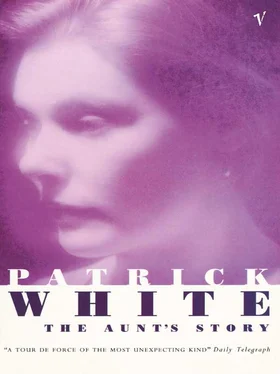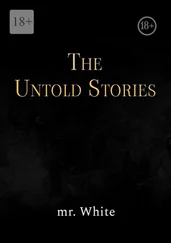Now that the man in the laundered shirt slept, Theodora Goodman could search her own purpose, her own contentment. I am going home, she said. It had a lovely abstraction to which she tried to fit the act. She tried the door of a house and went in. There were the stairs, and the cotton quilt on which she threw her jaded hat. She waited for the familiar sounds of furniture. She looked for her own reflection, in mirrors, but more especially in the faces of the people who lived in this house.
The train rocked the track. The man in the laundered shirt stirred. He was having trouble with his groin.
Then, in a gust, Theodora knew that her abstraction also did not fit. She did not fit the houses. Although she had in her practical handbag her destination in writing, she was not sure that paper might not tear. Although she was insured against several acts of violence, there was ultimately no safeguard against the violence of personality. This was less controllable than fire. In the bland corn song, in the theme of days, Theodora Goodman was a discord. Those mouths which attempted her black note rejected it wryly. They glossed over something that had strayed out of some other piece, or slow fire.
The train rocked the track.
Lying on her shelf at night, listening to the dying wind of many sleepers, Theodora was afraid that this movement might end in an intolerable clash of cymbals. So she compelled her stockings. So she unfolded herself from the narrow shelf. Her hat, with its large black gauze rose, more a sop to convention than an attempt at beauty, was easy to manage. It knew her head. She was soon ready.
There were bells in the night, wheels, and a long gush of steam.
Theodora trod down, out of the high, stationary train, on to the little siding.
A Negro with white eyes suggested that this was not the sort of thing that people did.
‘No,’ said Theodora. ‘But you will not tell.’
The Negro had a kind face. And he was sleepy.
And presently the train had gone, with all its magnificence of purpose, towards California. She heard in the distance its meek, flannel cough absorbing darkness.
There were several small streets of a small town, in which Theodora walked. The town lay wide open, between darkness and light. Soon the colour would drench back. But for the moment Theodora and the sleeping town were pale. Sitting on a step, her head against a tree, she waited for shapes to gather, or sleep. The drifting silence, and the broken sounds of sleep, and the watery colourlessness of early morning were all one.
Finally bark began to bite. She lifted her cheek from where it had been grained by the friendly tree. Sunflowers had appeared over a fence, though their big suns had not yet begun to flame. They were still bemused by dew. The town was pink, mostly, of baked mud, an earth pink. A bronze cock on a wall shook his feathers into shape. There were the frame houses too. The old sagging house, for instance, on the step of which Theodora sat. This house was still comfortable with sleep. But the bronze cock flaunted his metal throat and crowed. Somewhere a voice tore itself from a sheet. A thin, dark, perhaps an Indian woman, or a Mexican, lifted her head and looked, rising out of deep darkness Theodora saw. Theodora looked away, thinking that she recognized her own soul in the woman’s deep face.
The bronze cock was screaming. Voices came from kitchens, prominent voices, because they were still feeling their way, and cold, because every morning is the first.
Theodora looked up and saw the small white-haired woman, very white, floury white, who looked out of the house against which she was sitting. This woman had the young face of an old bright child. She had the appearance of looking for something at which to complain, but not in anger, for company. Then she saw Theodora Goodman and was so surprised she withdrew.
Recovering from her surprise, she soon came out again. The woman could not resist. She had a lot to tell. She would not ask much, but she would tell. And Theodora was glad of this, as she could not have answered. She did say that she had come by train. But the woman could not pause. She had to tell about her younger daughter Frances, who was multiplying on the coast, and her elder daughter, Myra, at Topeka, who had the hand for cheese cake. Then the woman remembered, and brought Theodora a cup of milk and a piece of sweet, fluffy bread. The bread was not real, but there was a blue shadow round the rim of milk, that she knew from childhood. She sank her mouth in the cool milk, and it became warm from her suddenly hot, protesting mouth.
‘Are you sick?’ the woman asked.
Theodora said that she was not.
Then it occurred to the small woman that she should start to arrange this stranger’s life, who had come by train, and did not know much.
‘Because you gotta go some where,’ the woman replied, when Theodora said she had not thought.
‘I do not particularly want to go anywhere,’ Theodora said. ‘Though I have money in my bag.’
There was not, fortunately, a great deal the woman wanted to know. So long as she could arrange a life she was content.
So she said there was a guest house farther up that was fine, with individual cabins, where people went, and artists, where Theodora should go, and there was a canyon, and an Indian pueblo, and an Indian that was petrified, from falling down a cliff and lying upside down in the right kind of water for many years. This is where Theodora should go. To rest. The woman’s son was going that way with a load of apples, presently, and Jake would run her up.
‘Jake!’ the small woman called. ‘Jake!’
The son raised his head from a dark window. He laughed, because he was still half-asleep, and because he did not know what else to do. Jake’s neck was muscular and golden. He rose, and he was a statue, but he would not reflect much, Theodora saw.
So it was arranged, while Jake threw water at his body.
Theodora sat in Jake’s truck. She waved good-bye to the small old child. She saw that by the middle of the day the fierce sunflowers would be oozing dust. Already the bronze cock brooded and drooped.
Then they went. The stiff road began to move. It became more sinuous. It swerved and dipped. The wind was quite serpentine at each curve of road, and before the hollows of white, flumping dust. They dived. Theodora Goodman and Jake sat high. It was grave, and dignified, and beautiful to fly like this through the empty landscape, but an emptiness that did not matter. The emptiness of this landscape was a fullness, of pink earth, and chalk-blue for sky. And the rim of the world was white. It burned.
Jake held the wheel. Driving, Jake was good. But they stopped too, and he was the same statue of hard, golden wax, that conveyed one or two ideas. From the back of the truck there was a smell of hot apples, the apples that they stopped for Jake to deliver, beside the road, or just off. Then Theodora sat in the smell of hot apples and dust. Once there was a bus pulled in at a gas station, and a dwarf was singing of eternity, as if he knew, and meant it.
They went on. Jake did not speak much. He laughed. They went on across the world, which Jake took for granted. Or they stopped. And Jake got down to juggle apples. Finally, Theodora was tired of Jake. She looked back once to see, but Jake did not, before she took the road that opened.
Theodora walked up the small side road, which went up the mountain, steep enough, and full of rocks. The sandy, rocky road wound up the mountain, for no set purpose, you would have imagined, except there was evidence occasionally that this must exist. The sand in softer parts between the rocks was bruised by tyres. Theodora was determined to follow this road. She was rigid with determination and purpose as she walked. Sometimes she bent to the greater incline of the road. Sometimes her dry mouth gulped. Sometimes the brown leathery flaps of her nostrils fastened with desperation on the air. She was walking between pines, or firs, anyway some kind of small coniferous tree, stunted and dark, which possessed that part of the earth. Animal life was moving in the undergrowth of dark, dead twigs and needles, and stiff, thistly things, and yellow grass. Small clearings were covered wholly with dead grass, which made a queer stiff sound of moving when there was wind. Theodora could smell the dust. She could smell the expanding odour of her own body, which was no longer the sour, mean smell of the human body in enclosed spaces, but the unashamed flesh on which dust and sun have lain. She walked. She smiled for this discovery of freedom.
Читать дальше












